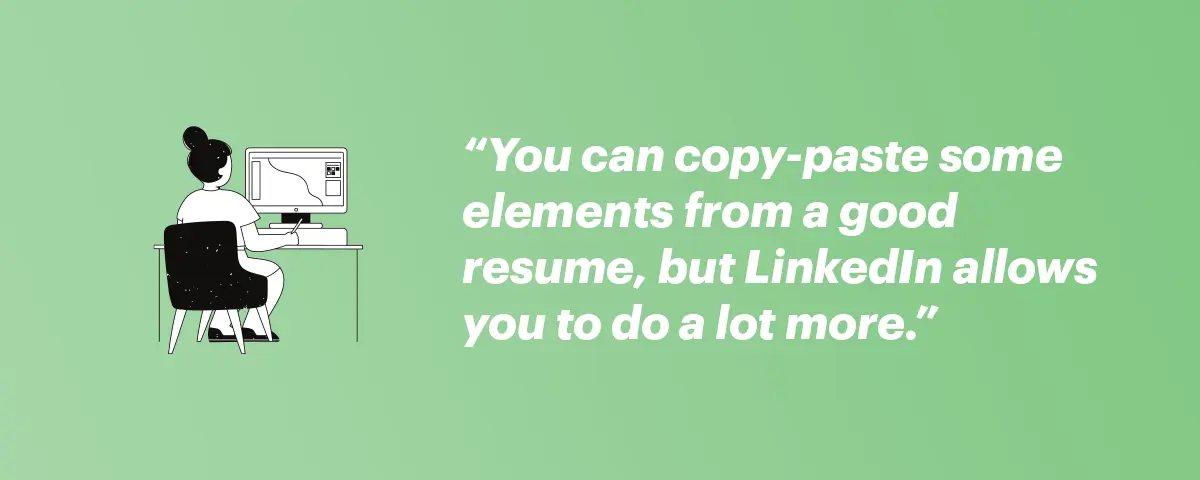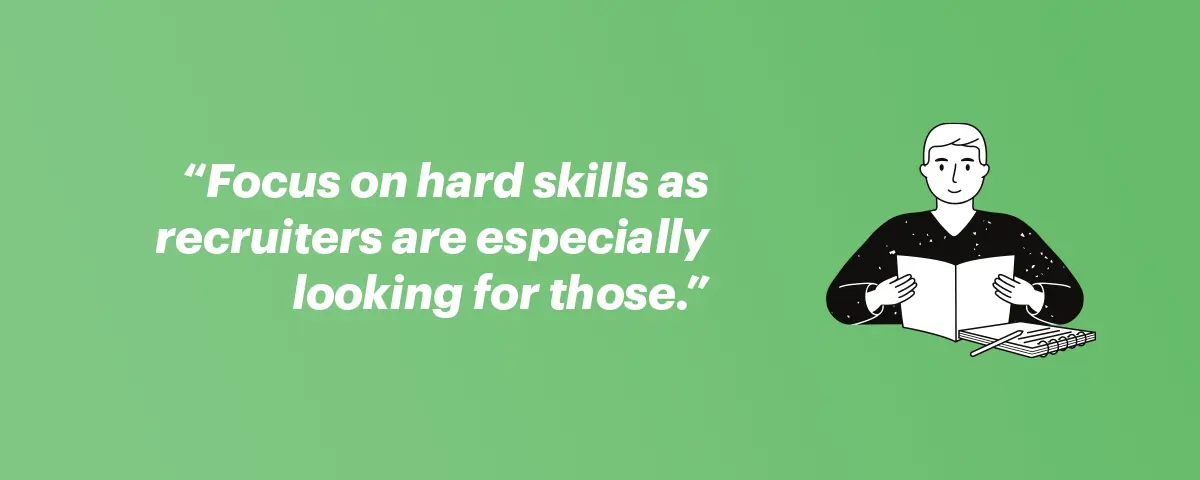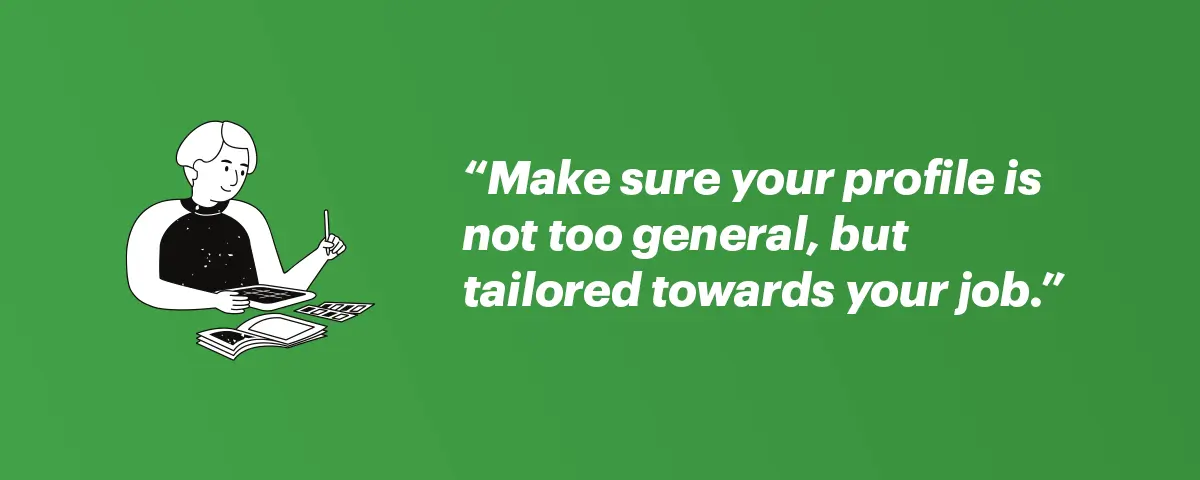Imagine you could get solid job search advice directly from someone with experience in recruiting and HR. Wouldn't that be helpful? Now you can do just that thanks to our new interview series Recruiter Reveals! Every month I interview our resident HR expert Christy Morgan on various job search topics — be it resumes, cover letters, job interviews, or anything marginally career related. |
A study found that 122 million people received an interview through LinkedIn with 35.5 million having been hired by a person they connected with on the site.
If that didn't persuade you that you really need to have a LinkedIn profile when job searching, our interview hopefully will.
However, there's a difference between having a LinkedIn profile and having a really good profile.
Should you just copy-paste your resume content? Can you use a selfie? Do you need recommendations? Or endorsements for your skills? And how do you even use your LinkedIn profile to find a job? We'll discuss all that and a lot more!
In this interview, you'll find out:
- Why not being on LinkedIn can cost you job offers;
- How hiring on LinkedIn works;
- How HR managers check applicants' LinkedIn profiles;
- What kind of information they are looking for;
- How to create a killer LinkedIn profile step-by-step;
- How to SEO-optimize your profile;
- How to use LinkedIn to find a job;
- Whether it's enough to have a killer profile or you also need to engage.
More than 87% of recruiters use LinkedIn as part of their hiring process, yet many job seekers don’t use it. What do you think is the reason?
I think a lot of people do have profiles at least. But they don't necessarily keep it up-to-date. Or they forget it’s also a useful tool for job seeking and hiring. They don't always know how it's advancing in terms of features and opportunities.
Also, I feel like people are saturated by social media these days. The rise of influencers on LinkedIn means you're getting a lot of inspirational posts in your feed, and some people are put off by that. So, they don't look at LinkedIn as being necessarily the number one career progression tool to use.
Plus, it also depends on the country. For instance, in the US or UK, many job seekers understand that it's a well-used tool and it's popular for recruiters. But if you're from a country where LinkedIn isn't so popular, you may not know how to use LinkedIn to find a job.
Can it cost job seekers job offers?
I'm sure it does. Again, it depends on the country you're in, but a lot of recruiters use it these days. Companies often cross-post jobs there, or use it to search for candidates. So, if they're only posting there and a couple of other places, then you might not see those opportunities.
Can it also cost you a job offer when you've already applied for a job and the hiring manager wants to do an online check and can't find you on LinkedIn?
Unless you work in digital media or another sphere where having a visible online presence is super important, it’s not necessarily a game changer. But of course, there may be a recruiter who'll say “Well, they're not keeping it up to date, or I can’t find them — that's not good.” Personally, I don't see it as the biggest red flag. It might be a question mark whether they're hiding something, particularly if they’re reasonably well-established in their career. But I don't think it should be the biggest consideration.
What is worse then? Not having a LinkedIn profile, or having a bad LinkedIn profile?
I don't know if one is worse than the other. As for not having a profile, it's your choice whether you do or you don't have one. And it depends on the recruiter's perception.
As for a bad profile, if the recruiter is only using LinkedIn to find people and your profile doesn’t properly reflect your skills and experience, then it will hurt your chances. Sometimes recruiters have a limited number of InMails that they can send, so they’re going to carefully decide who they'll approach. If someone doesn't have a relevant profile, they'll go for someone who has. So, practically the same as not having a profile at all.
However, if they've already seen your resume and they go to your LinkedIn just to check it, then it shouldn't do any harm. Because they have the evidence of your professional history and your skills on the resume, which is usually the most important source.

You've used LinkedIn for hiring or background-checking candidates in the past. Could you describe the process in more detail?
Companies use it to find both passive and active candidates. Passive candidates are the ones who aren't applying for jobs, but are open to exploring job opportunities. As for searching them, recruiters use free or paid tools. For free, you can do basic searches for people who have made themselves available to be seen by a recruiter. But you get very basic level stuff. Then you have the paid tools, which at the higher end even enables your company to integrate LinkedIn with your ATS. You can share profiles with your colleagues and see message and activity histories. When I used LinkedIn for hiring in the past, I loved the ease and reach of searching through such a wide pool of candidates.
What about checking active candidates who have applied for a job? What kind of information are recruiters looking for in their profile?
I firstly look at things like their current job responsibilities and accomplishments, as well as their earlier roles, to check for general consistency with the resume if I have that already — which is where having a complete profile helps. Because LinkedIn is public, so you're less likely to hide or misrepresent stuff.
I would also look at their summary for any other useful information, as well as their location (are they where they say they are, particularly international candidates?). And if I was going to be particularly picky, I'd look at how well connected they are, and in general if I feel they are legitimate and professional. But the most important thing really is career history, education, and skills consistency.
Do you also expect to find more information there than on their resume? Given the fact that resumes are limited in length.
Usually, yes. On your resume, you typically focus on specific aspects and you're limited by a number of pages. LinkedIn enables you to have your whole career history visible if you wish. So it might be interesting for me to see the earlier stuff as well. Maybe I'll see other things that you forgot to put on your resume like certifications, key skills, interesting volunteer work and projects. This all helps to give me a better feel for you as a person.
Can job seekers fail to get hired because of their LinkedIn profile?
I would hope not. I've never heard of that, and it shouldn't, unless you’ve put something controversial or strongly contradictory there. The only way I could see it is if you don't have enough information to convince the recruiter to approach you — or if you’re applying for a job as a LinkedIn Profile Specialist and you have a dreadful profile!
So now we can talk about how to create that killer LinkedIn profile as a job seeker. Let's start with a profile picture.
I recommend having a profile picture because of the whole social aspect. At heart, it's a people platform. It adds to the perception of you as a real person and adds to your legitimacy. Because there are fake profiles out there, unfortunately.
Regarding the picture itself, you don’t need to be in full business wear. A good headshot with a clear view of your face is perfectly acceptable. Just be careful about what's in the picture — definitely no bikini pictures or you glugging on a can of beer. Keep it professional. A selfie is completely OK, as long as it looks appropriate for a business platform.
What about the cover picture? What should they include there?
You don't have to have one, but it can add a little bit of color or interest. If you include it, keep it professional and go for something that represents you, your achievements, or your profession. I wouldn’t use something like your favorite football team or a picture of your kids.
For example, some people have their home cities. Some people have something that represents their job. For instance, one of my clients works in the airline industry, and has an attractive landscape/cloud image they took out of a plane window. But using a one-coloured background is completely fine too.
What do you think about using photos with a company logo as a cover picture? Is it a good thing?
It depends. If you're using it as a networking tool for your company, then sure. But as a job seeker, I would definitely avoid that.

What about a LinkedIn summary? Can I just copy-paste my resume summary?
You can if it's a good resume summary, not something like “I'm looking for an accounting job.” In mine, I tell people who I am and what I do, incorporating major keywords that people may use to search for someone with my background. I recommend job seekers do the same. For example, if the recruiter's looking for a media account manager with 5 years of experience, make sure that's included in your LinkedIn summary. Don’t forget to incorporate any keywords that are relevant to your job. It should be very specific, not too generic or general.
What about featured media? What kind of things would you advise job seekers to add there?
You don't have to put anything, but if you have something that's relevant to your job, feel free to add it there. For example, if you work in the media, you can upload samples of your work. If you're an interior designer, you can include selections from your portfolio.
But if you're doing a job that doesn't require that sort of thing, for instance if you're an accountant or an administrator, there's no need to put anything.
Regarding work experience — should I include all jobs?
You can, but I'll say my usual — it depends. First of all, it depends on the level of experience. If you're junior, you may want to include everything to reflect more depth of experience. In case you're more senior or mid-level, for the older jobs you can just leave the titles and companies and don't need to include job descriptions - unless you have some significant accomplishments worth mentioning.
If you have earlier job titles which aren't relevant any more, for instance internships or junior positions, you can leave these out unless it's super impressive, say an internship at the United Nations. Or at least, remove the job descriptions. As for job descriptions for more recent jobs, you can transfer them from your resume. Just make sure they're keyword-rich.
What about skills? What skills should I include? And how many?
You can have up to 50 skills. Use them wisely, because once you start adding them, suddenly the 50 aren't enough. :D First of all, focus on hard skills, as recruiters are especially looking for those. Whatever are the typical main skills for the jobs you're applying for, make sure to include them. And then you can also add some soft skills if you have some space left.
Isn't adding 50 skills a bit too much?
When I do profiles for my clients, I usually use all 50. It isn't too much, because you want to increase your chances of coming up in their search with whatever keywords they’re using by maximizing SEO. But of course, I advise to only add relevant skills, so if you have fewer than 50, that’s totally OK.
When recruiters check these skills, does it matter to them if my skills are endorsed by other people?
I have a question mark over that. Partly because it's too easy to endorse somebody and I also get endorsed by people for example for management, even if they have no clue how good I am at management. Sometimes, people feel obliged to endorse others when they see that LinkedIn prompt on their screen about ‘Would you recommend John for xyz? Does John have xyz skills?’ So, it's a nice thing, but I don't think it necessarily adds more credibility.
What other things should I include in my profile? Is it the same things as on my resume, such as certifications, volunteer experience, projects, and so on?
Yes exactly. LinkedIn also enables you to feature recommendations from others about you and your work. However, this one again is a question mark to me. There's no harm in having them, but they should be meaningful. Sometimes they're kind of generic like “Oh, this person is a great person to work with, I can highly recommend them.”
They should go into a little bit more in detail, for instance, what kind of project you worked on together, what specific skills you've demonstrated, perhaps some non-generic feedback. That gives me more meaningful insight into you as a professional and person. And if these recommendations are good, they'll impress the hiring managers and can also be good conversation starters.
How many recommendations should job seekers have?
The most important thing is to have quality recommendations. If you only have one or two, fine, as long as they are not generic and help to tell your story. It’s also perfectly OK to have none at all.

What about LinkedIn SEO? How can I best optimize my profile?
Make sure your profile is not too general, but tailored towards your job. Make sure it's up to date, relevant, and keyword-rich. Include important keywords in the summary, work experience descriptions, and key skills section. You can also add hashtags to keywords to your summary. I typically add a list of hashtagged key skills after the summary paragraph, but some people incorporate these into the text itself.
And when you're looking for a job, take advantage of features such as career interests, where you can specify what kind of jobs you're looking for, ideal locations, and if you want full-time, contract, etc. This means you’ll more relevantly appear in recruiter searches.
Is having a killer LinkedIn profile enough, or do I also need to engage and show some activity on LinkedIn?
Not necessarily, because hiring managers are mainly looking to see that you are who you say you are based on your summary, job descriptions, etc. I can’t imagine a huge number are trawling through your previous posts, activity, etc., but they might. Either way, make sure that any activity that is visible on your profile, is professional and appropriate.
And how can I get noticed by a company I like? Should I follow them or comment on their posts?
Some people say if you follow a company, it shows them you're interested in them and it could be a potential tool for the recruiter to find you. I know that’s happened, but I don't think that’s a regular occurrence. I think being noticed on LinkedIn by these companies is going back to having that killer profile that we've talked about earlier, applying for jobs, and professionally interacting with their posts.
The bigger companies get plenty of comments and they're not going to necessarily notice you that way. If it's a smaller company, it may happen. Either way, make sure your comments are relevant and insightful and show that you could add value to their team. Just don’t bombard them with comments, particularly if you’re just commenting to comment, hoping someone notices your enthusiasm!
How to use LinkedIn to find a job then? What's the best strategy?
First of all, set up job alerts for the types of jobs you're looking for. You can do that by job title and location, and LinkedIn will alert you daily or weekly by email and/or LinkedIn notification. Make sure that you've got your LinkedIn career interests section switched on to show that you’re open to opportunities. This is relatively confidential and unless somebody from your company is looking for specific people similar to your job, you're very unlikely to come to their attention.
When the pandemic began affecting jobs on a mass scale, LinkedIn added an ‘Open to Work’ banner that you can include in your profile picture. I would be careful about this one if you're currently employed, because you probably don’t want your boss to see it :D
You can also specify if you're looking for a full-time contract, remote job and so on, so that really helps to narrow it down. Then make sure your profile is up-to-date and well-optimized for the type of job you're looking for.
Should I also add a link to my LinkedIn profile on my resume?
Yes, I do that for all my clients. Because recruiters are probably going to check you out anyway, so let's make sure they find the right profile and can find you straight-away.
Key takeaways: How to use LinkedIn to find a job
- Create a killer profile: Use a professional profile picture and a cover photo that represents you or your profession. In your summary, explain who you are and what you do (plus incorporate relevant keywords). In a featured section, include samples of your work (if applicable). In the work experience, you can include your entire career history — for older jobs, you can just leave the titles and companies. In your skills section, focus on hard skills and then add some soft skills if you have some space left. Then you can also include other things like certifications, volunteer experience, projects, or recommendations (make sure they're meaningful and not too generic).
- SEO-optimize your profile: Make sure your profile is not too vague, but tailored towards the job you want. Make sure it’s up to date, relevant, and rich with keywords. Also, take advantage of features such as career interests, where you can specify what kind of jobs you’re looking for, suitable locations, and whether you're looking for a full-time job, contract work, freelance, etc.
- Use LinkedIn features: Set up job alerts for the types of jobs you’re looking for. Make sure that you’ve got your career interests section switched on to show that you’re open to opportunities. If you're unemployed, you can also add an ‘Open to Work’ banner in your profile picture (be careful about this one if you’re currently employed).
Ready to harness the power of LinkedIn for your job search with our recruiter's insights? Perfect! Level up further by transforming your LinkedIn profile into a polished, professional resume with our easy-to-use tool.




